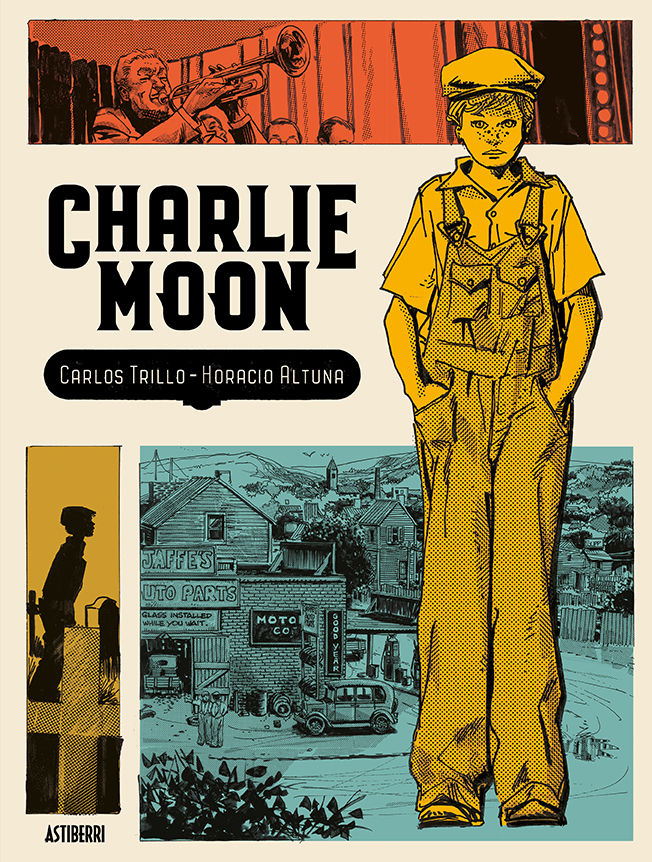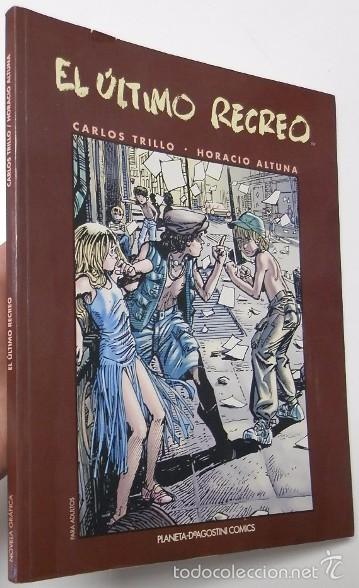
During this period, he also worked with Juan Bobillo on 'Zachary Holmes' and 'Sick Bird'.

After meeting a CIA agent, Trillo was inspired to create 'Mon nom n'est pas Wilson', which is illustrated by Walter Fahrer and published by the French publisher Casterman from 2000.
#El ultimo recreo horacio altuna series
Trillo and Mandrafina worked together again on 'Peter Kampf' (1987-88), 'Cosecha Verde' (1989-90), 'Dragger' (1991-93) and 'Spaghetti Brothers' (Lanciostory, 1993-98).įrom 1992 to 1997, he created 'Cybersix' with Carlos Meglia, a series about genetic manipulated creatures.

He made short stories for Puertitas with Saborido, Enio and Zaffino in the early 1990s. Their post-apocalyptic series 'Point de Rupture' was published by Delcourt in France from 2009. Trillo also had a versatile cooperation with Eduardo Risso, creating 'Fúlu' (1988-91), 'Boy Vampiro' (1990-92), 'Vidéo Noire' (1992), 'Borderline' (1993-95), 'Los misterios de la Luna roja' (1997-98) and 'Chicanos' (2005), a series situated in the Spanish ghetto of an American metropolis. With Jordi Bernet he first made 'Carnage Plus' and 'Light and Bold', before creating 'Clara de Noche' in El Jueves in 1992 and 'Cicca Dum Dum' (published in France as 'Bang Bang') in Penthouse in 2001. Throughout the 1980s and 1990s he expanded his collaborations. In addition, he made 'El Extraño Juicio a Roy Ely' with Juan Giménez and 'Polución nocturna' with Alberto Dose in 1980-81. Trillo worked with Domingo Mandrafina on serials like 'Los Misterio de Ulises Boedo' and 'Historias Mudas' in the early 1980s. The comic 'El Negro Blanco', that he wrote for Ernesto García Seijas, succeeded 'El Loco Chávez' in Clarín in 1987. These appeared in magazines like El Pendula, Superhumor, Skorpio and Zona 84. Other collaborations with Altuna are 'El Peregrino de las estrellas' (1978-81), 'Los viajes de Marco Mono' (1979), 'Laura Holmer' (1980), 'Merdichesky' (1981), 'Tragaperras' and 'Charlie Moon' (both 1984). In Argentina it was published in Superhumor and later in Fierro. The film based on the story won an award during the Chaplin Humor Festival in Vevey, Switzerland in 1988.Īlso with Altuna, he made 'El Último Recreo' for the Spanish magazine 1984 in 1982. Made during a period of censorship and dictatorship, the comic depicts the coward clerk López, who finds his greatest pleasures and deepest fears in an alternate world behind bathroom doors. López' for science fiction magazine El Pendulo in 1979, and in Humor from 1980. Trillo and Altuna also created 'Las puertitas del Sr. He furthermore created 'El Loco Chávez' with Horacio Altuna, a comic strip that appeared daily at the back of the newspaper Clarín from July 1975 to November 1987. Arias ('Foster de las Islas' in Skorpio, 1977) and Félix Saborido ('Kangaroo O'Neil' in Pif-Paf, 1978). Other early collaborations were with Pérez d'Elias ('Detective's Studio' in Skorpio, 1976-78), Víctor H. With Breccia's son Enrique, he created 'Alvar Mayor', a series that was published in Skorpio between 19, but was also reprinted in Italy, France and Spain. Also with Breccia, he made 14 episodes of 'Nadie' for Ediciones Record between 19. From the first issue, he wrote 'Un tal Daneri' for Alberto Breccia. In 1975 he was involved in the launch of Mengano magazine. Trillo served as art director for this magazine, until it was forbidden by the military dictatorship in 1976. In 1972 he founded the satirical magazine Satiricon with Oswal, Horacio Altuna and Lito Fernández. He was additionally a journalist and writer for the publisher García Ferré, and he also scripted stories with 'Hijitus', 'Antifaz', 'Topo Gigio' and 'La Familia Panconara'.

He worked for this magazine from 1963 to 1968. Trillo wrote his first scenario at age 20 for Patoruzu magazine. Carlos Trillo was a versatile and remarkable comic writer from Argentina, who worked with many famous artists.


 0 kommentar(er)
0 kommentar(er)
